Filter News
Area of Research
News Topics
- (-) Artificial Intelligence (7)
- (-) Critical Materials (4)
- (-) Frontier (4)
- 3-D Printing/Advanced Manufacturing (26)
- Advanced Reactors (2)
- Big Data (5)
- Bioenergy (13)
- Biology (23)
- Biomedical (10)
- Biotechnology (5)
- Buildings (13)
- Chemical Sciences (7)
- Clean Water (8)
- Climate Change (11)
- Composites (6)
- Computer Science (30)
- Coronavirus (10)
- Cybersecurity (5)
- Decarbonization (7)
- Energy Storage (22)
- Environment (39)
- Exascale Computing (2)
- Fusion (8)
- Grid (11)
- High-Performance Computing (19)
- Isotopes (12)
- ITER (4)
- Machine Learning (1)
- Materials (32)
- Materials Science (22)
- Mathematics (1)
- Mercury (3)
- Microscopy (10)
- Nanotechnology (10)
- National Security (7)
- Net Zero (1)
- Neutron Science (18)
- Nuclear Energy (6)
- Physics (3)
- Polymers (5)
- Quantum Computing (5)
- Quantum Science (12)
- Security (3)
- Space Exploration (4)
- Statistics (1)
- Summit (9)
- Sustainable Energy (35)
- Transportation (21)
Media Contacts

A world-leading researcher in solid electrolytes and sophisticated electron microscopy methods received Oak Ridge National Laboratory’s top science honor today for her work in developing new materials for batteries. The announcement was made during a livestreamed Director’s Awards event hosted by ORNL Director Thomas Zacharia.
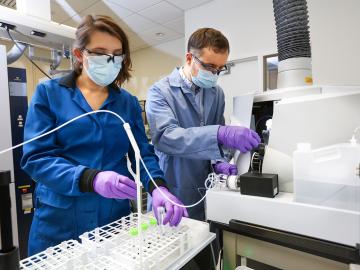
A new technology for rare-earth elements chemical separation has been licensed to Marshallton Research Laboratories, a North Carolina-based manufacturer of organic chemicals for a range of industries.
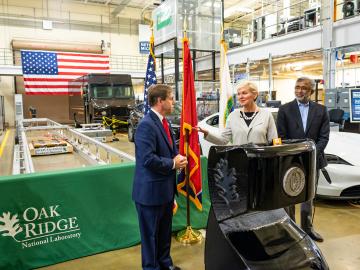
Energy Secretary Jennifer Granholm visited ORNL on Nov. 22 for a two-hour tour, meeting top scientists and engineers as they highlighted projects and world-leading capabilities that address some of the country’s most complex research and technical challenges.

The U.S. Department of Energy’s Office of Science announced allocations of supercomputer access to 51 high-impact computational science projects for 2022 through its Innovative and Novel Computational Impact on Theory and Experiment, or INCITE, program.
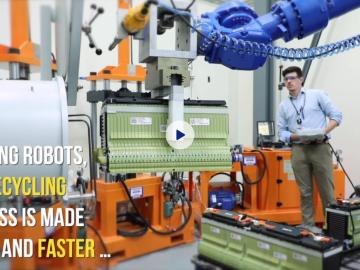
Researchers at ORNL have developed a robotic disassembly system for spent electric vehicle battery packs to safely and efficiently recycle and reuse critical materials while reducing toxic waste.
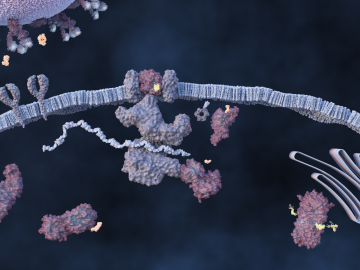
An ORNL-led team comprising researchers from multiple DOE national laboratories is using artificial intelligence and computational screening techniques – in combination with experimental validation – to identify and design five promising drug therapy approaches to target the SARS-CoV-2 virus.
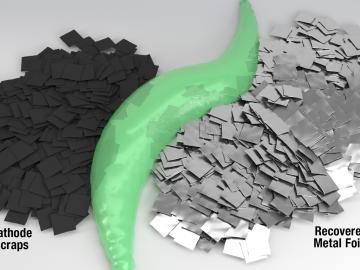
Scientists at Oak Ridge National Laboratory have developed a solvent that results in a more environmentally friendly process to recover valuable materials from used lithium-ion batteries, supports a stable domestic supply chain for new batteries

Deborah Frincke, one of the nation’s preeminent computer scientists and cybersecurity experts, serves as associate laboratory director of ORNL’s National Security Science Directorate. Credit: Carlos Jones/ORNL, U.S. Dept. of Energy
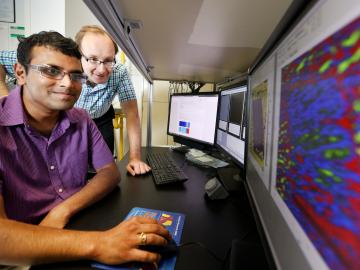
At the Department of Energy’s Oak Ridge National Laboratory, scientists use artificial intelligence, or AI, to accelerate the discovery and development of materials for energy and information technologies.

The Department of Energy’s Oak Ridge National Laboratory has licensed its award-winning artificial intelligence software system, the Multinode Evolutionary Neural Networks for Deep Learning, to General Motors for use in vehicle technology and design.




